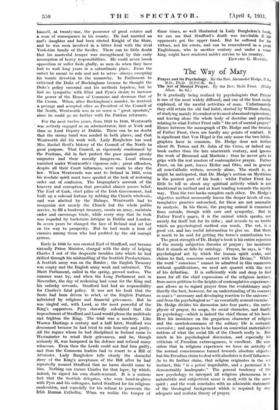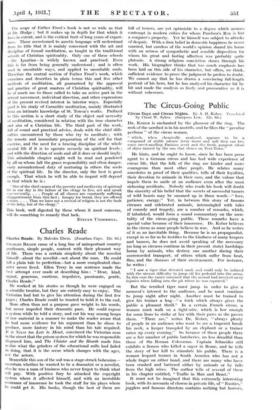The Way of Mary
Prayer and its Psychology. By the Rev. Alexander Hodge, B.A., B.D., Ph.D. (S.P.C.K. 6s.)
The Art of Mental Prayer. By the Rev. Bede Frost. (Philip Allan. 8s. 6c1.)
IT is gradually being realized by psychologists that Prayer is one of the most widely diffused, and one of the least easily explained, of the mental activities of man. Unfortunately they still retain the old bad habit, started by William James, of studying mainly its crudest or its most abnormal expressions ; and leaving alone the whole body of doctrine and practice relating to what Father Frost calls " the art of mental prayer." Hence between the monograph of Dr. Hodge and the treatise
of Father Frost, there are hardly any points of contact. It is significant that Von Hugel is the only name the two biblio-
graphies have in common. Dr. Hodge does not bother about St. Teresa and St. John of the Cross, or indeed any book earlier than the late nineteenth century, and ignores the work of Bremond and Maritain : thus he never gets to grips with the real masters of contemplative prayer. Father Frost, on his part, leaves Heiler and Otto, and in general
all non-Catholic writers, severely alone. The result is, as might be anticipated, that Dr. Hodge's section on Mysticism
is the poorest part of his book : whilst Father Frost has little to tell us about any spiritual activity which is not traditional in method and at least tending towards the mystic way. ThuS the two books complete each other. Dr. Hodges objective method necessarily leaves the deeper levels of con- templative practice untouched, for these are not amenable to analysis. In his thesis; the praying animal is examined from outside, though with care and sympathy. But in Father Frost's pages, it is the animal which speaks, not merely for itself but for its tribe ; and reveals to us truths which no psychological method can reach. The vet. is a good vet. and has useful information to give us. But there is much to be said for getting the horse's contribution too.
The great strength of Dr. Hodge's book is his entire rejection of the merely subjective theories of prayer ; his insistence that it stands or falls by ontology. Prayer, he says, is " the psychological act by which the human spirit seeks, and claims to find, conscious contact with the Divine." Whilst the word conscious " cannot be admitted in this connexion without qualifications, we need not quarrel with the rest of his definition. It is sufficiently wide and deep to find room for all the chief expressions of the religious instinct, from naive petition to the heights of contemplative experience ; and allows us to regard prayer from the evolutionary angle (hardly the best, however, for an understanding of its essence) as man's " necessary and developing reaction to the universe." and from the psychological as " an essentially normal exercise."
Dr. Hodge divides his discussion into four parts ; the meta- physic of prayer, its scope, its social character, and finally its psychology—which is indeed the chief theme of his book.
Here his insistence on the gregarious character of religion and the unwholesomeness of the solitary life is certainly excessive ; and appears to be based on somewhat materialistic notions of what the social life of the Church really is. But much in his psychological discussion, and especially his
criticism of Freudian extravagances, is excellent. He con- siders that in religious experience we have an activity of the normal consciousness turned towards absolute objects ; but the Freudian claim to deal with absolutes is itself fallacious. As to its further claim, that religion originates in the sex instinct, this " is a priori improbable, and a posteriori it is demonstrably inadequate." The general tendency of the new psychology to interpret all religious phenomena in a naturalistic and subjectivist sense is dealt with in the same spirit ; and the work .concludes with an admirable statement of the theological background which is required by - any adequate and realistic theory of prayer.
The scope of Father Frost's book is not so wide as that of Dr. Hodge ; but it makes up in depth for that which it
loses in extent, and is the evident fruit of long years of experi- ence. Those accustomed to ascetic language will understand
from its title that it is mainly concerned with the art and discipline of formal meditation, as taught in the traditional schools of Christian spirituality. Only one of these schools —the Ignatian—is widely known and practised. Even this is far from being generally understood ; and is often used in unsuitable ways, and applied to unsuitable souls.
Therefore the central section of Father Frost's work, which examines and describes in plain terms this and five other methods of meditation, all guaranteed by the approval and practice of great masters of Christian spirituality, will be of much use to those called to. take an active part in the retreat movement, individual direction, and other expressions
of the present revived interest in interior ways. Especially good is his study of Carmelite meditation, mainly illustrated from an intimate knowledge of St. Teresa's works. Prefixed to this section is a short study of the object and necessity of meditation, considered in relation with the true character and aim of a Christian life. The third part of the work, full of sound and practical advice, deals with the chief diffi- culties encountered by those who try to meditate ; with the remote and immediate preparation of the self for that exercise, and the need for a bracing discipline of the whole mental life if it is to operate securely on spiritual levels ; and with the direction of souls and all it does or should imply. This admirable chapter might well be read and pondered
by all on whom fall the grave responsibility and often danger- ously misunderstood duty of nurturing in others the seeds of the spiritual life. In the director, only the best is good enough. That which he will be able to impart will depend on that which he is :
One of the chief causes of the poverty and mediocrity of spiritual life in our day is the failure of the clergy to live, act and speak .viperna!urally. . . . People of all classes are constantly suffering disappointment from this fact ; hungry for bread, they are offered a stone. . . . That we have not a revival of religion is not the fault of the laity, but of the clergy."
This book, well digested by those whom it most concerns, will do something to remedy that lack.
EVELYN UNDERHILL.









































 Previous page
Previous page